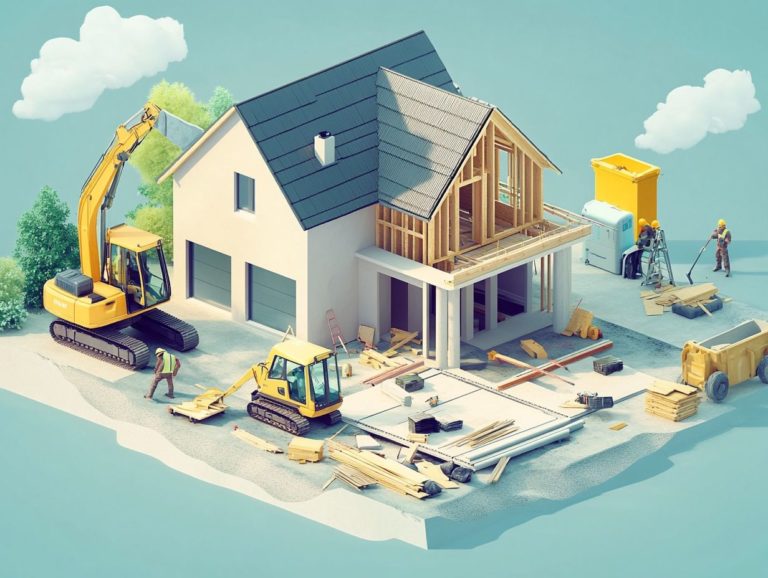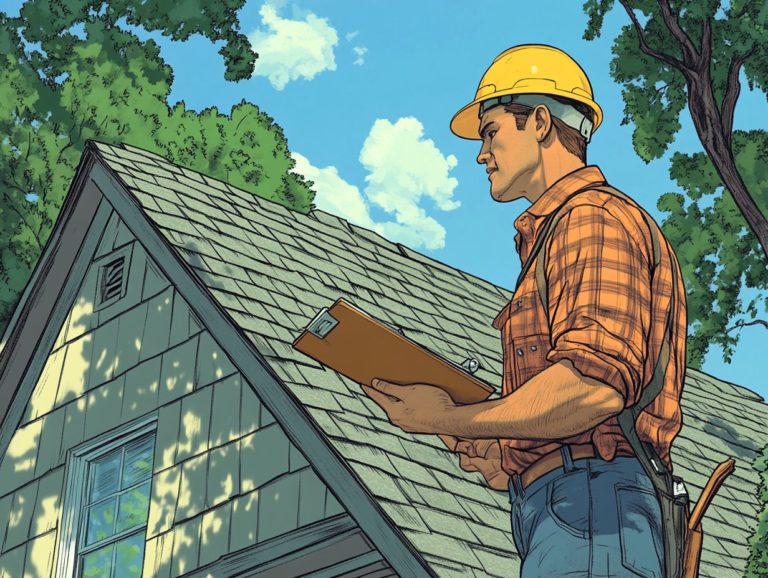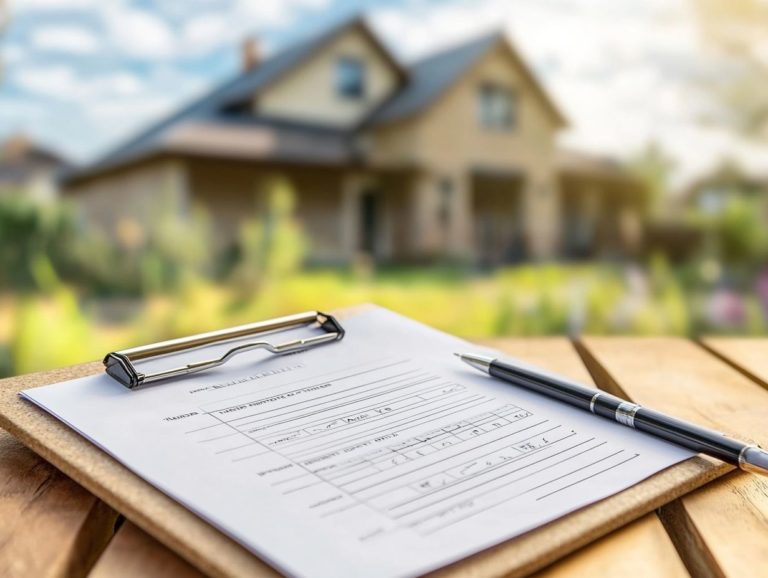Essential Tools for Home Inspectors
Home inspections may seem overwhelming, but possessing the right tools transforms the experience into a seamless endeavor.
Whether you re a seasoned expert or just embarking on your journey, arming yourself with essential instruments is crucial for conducting thorough and efficient inspections.
From identifying moisture problems to evaluating electrical systems, each tool plays a distinct role in the process.
This article delves into the indispensable equipment every home inspector should contemplate, empowering you to elevate your inspection skills and guarantee that no detail escapes your notice.
Contents
- Key Takeaways:
- 1. Flashlight
- 2. Ladder
- 3. Moisture Meter
- 4. Electrical Tester
- 5. Digital Camera
- 6. Gas Leak Detector
- 7. Infrared Thermometer
- 8. Screwdriver Set
- 9. Tape Measure
- 10. GFCI Outlet Tester
- 11. Inspection Mirror
- 12. Circuit Analyzer
- 13. Non-Contact Voltage Detector
- 14. Protective Gear
- 15. Home Inspection Software
- Frequently Asked Questions
- What are the essential tools for home inspectors?
- Why is a flashlight important for home inspections?
- What is the purpose of a ladder in home inspections?
- How does a moisture meter help home inspectors?
- Why is an electrical tester necessary for home inspections?
- What are the benefits of using a thermal imaging camera in home inspections?
- Why do home inspectors rely on technology?
Key Takeaways:
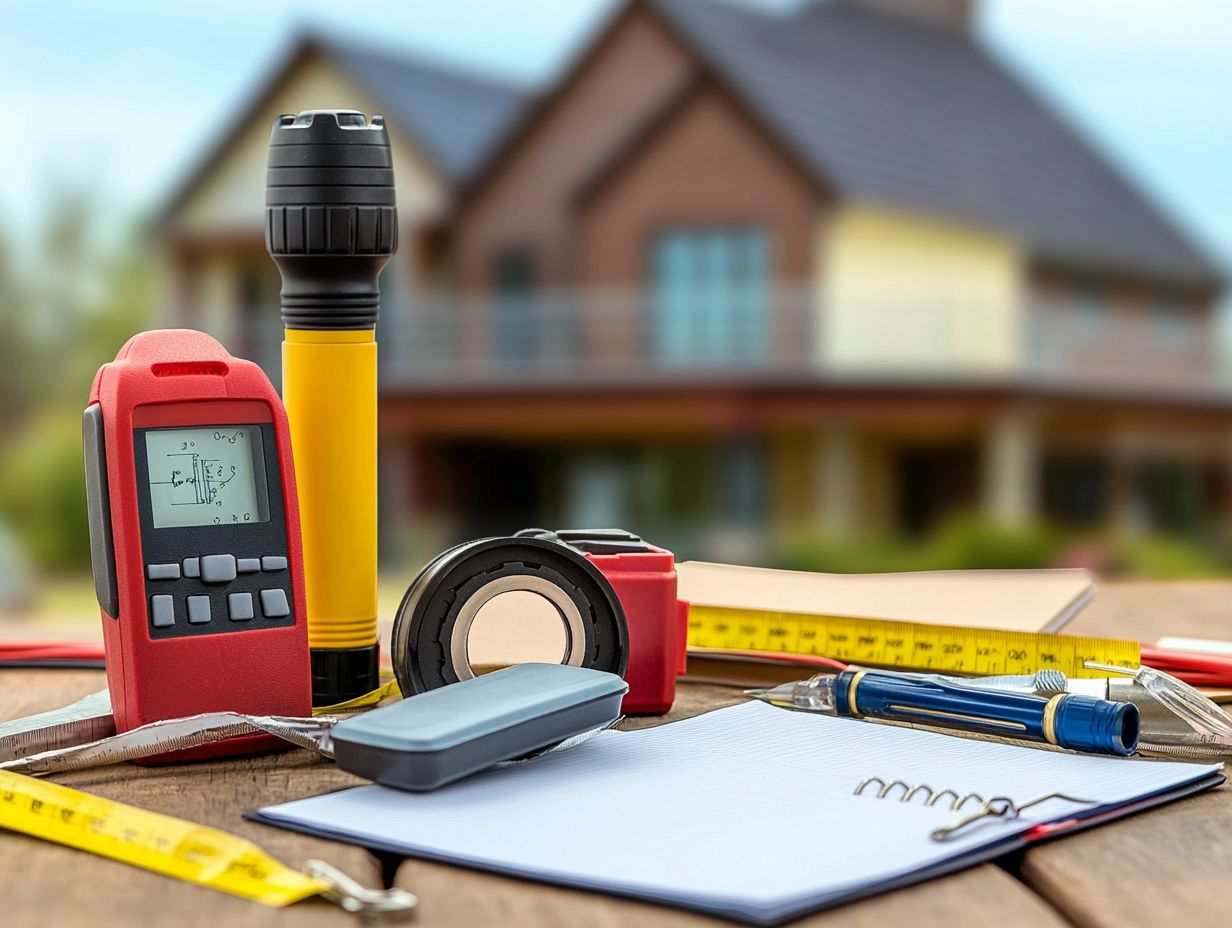
- A reliable flashlight is key for dark and hard-to-reach spots.
- A sturdy ladder helps you safely inspect roofs and attics.
- A moisture meter detects hidden water damage to prevent costly repairs.
1. Flashlight
A flashlight is vital for home inspections. It provides the light needed to check every corner for issues like water damage or electrical hazards.
The importance of using a high-quality flashlight goes beyond mere convenience; it directly influences the accuracy of your inspection. A flashlight with adjustable brightness settings lets you adapt to various environments, ensuring that even the darkest corners are well-lit.
Robust battery life is crucial for extended inspections, preventing unexpected outages that could result in missed details. Durability is another key feature; a sturdy flashlight withstands frequent use and challenging conditions.
Picture this: you uncover hidden mold behind a wall during your inspection! Such discoveries can save your clients a lot of trouble.
2. Ladder
An extendable ladder is essential for your work as a home inspector. It grants you safe access to roofs and high areas to assess structural integrity and identify potential issues without sacrificing safety or efficiency.
Its lightweight design makes transportation a breeze, perfect for those who frequently travel between various job sites. When fully extended, it offers excellent stability, thanks to its robust locking mechanisms and wide base.
Safety features like anti-slip rungs and stabilizing feet enhance its reliability during your inspections. Always remember to wear safety goggles to shield your eyes from debris while navigating elevated heights.
This blend of practical advantages and safety measures ensures that your inspections proceed smoothly and securely.
3. Moisture Meter
A moisture meter measures how much water is present in materials, making it essential in home inspections. This information can reveal underlying issues such as leaks or mold growth.
These devices come in various types, including pin-type meters that measure electrical resistance through electrodes and pinless models that use electromagnetic waves to assess moisture without causing damage.
Understanding moisture presence is vital for maintaining structural integrity and protecting your health, as prolonged moisture can lead to mold and mildew.
By using a moisture meter, you enhance the integrity of a property and contribute to a safer living environment, underscoring its significant value in maintenance and inspection processes.
4. Electrical Tester
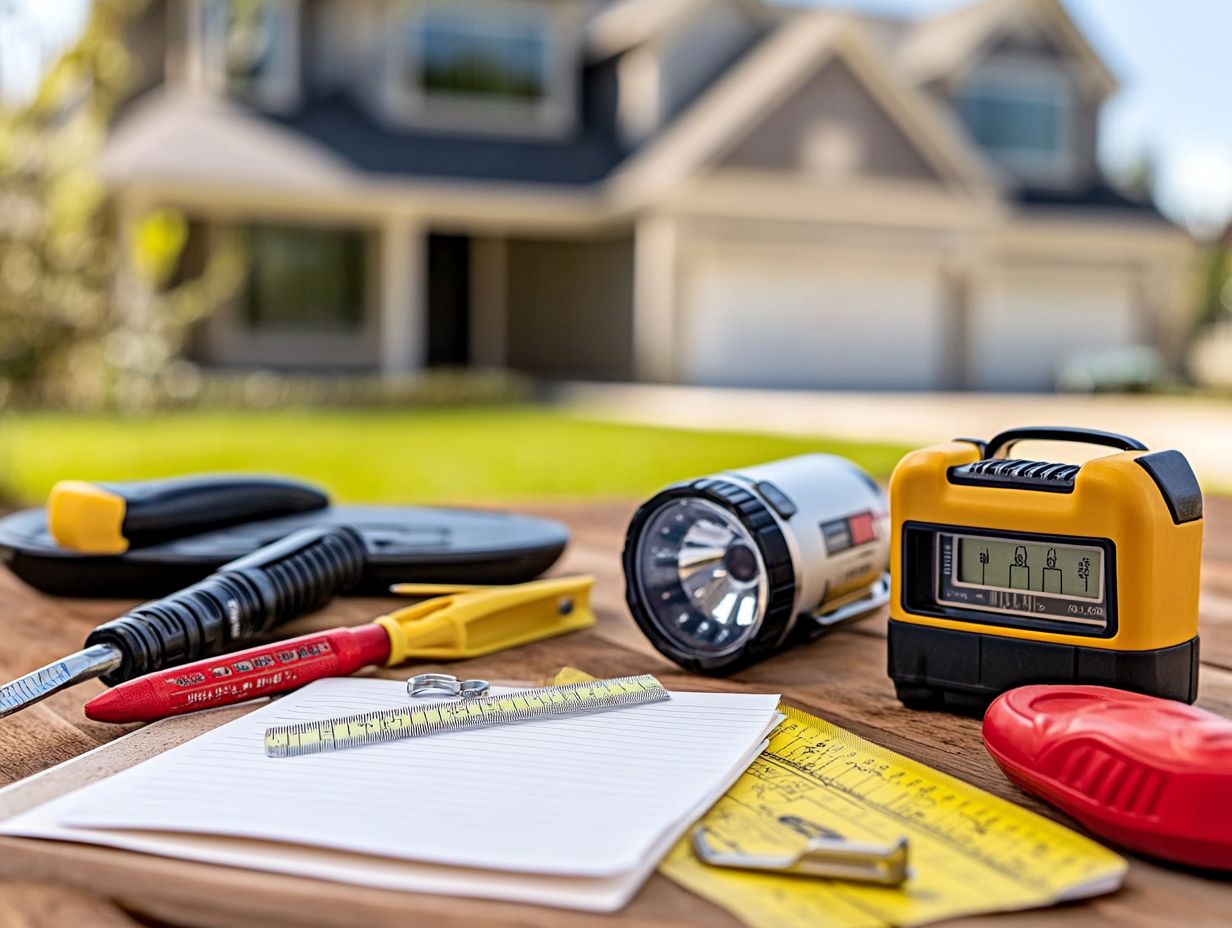
An electrical tester is essential for you as a home inspector. It grants the ability to evaluate electrical systems for both functionality and safety. This ensures meeting safety standards and helps prevent potential hazards.
These tools come in various forms, with voltage multimeters being particularly useful. They can measure current, voltage, and resistance, allowing you to diagnose issues within electrical circuits effectively. This versatility is key to promoting safe electrical practices.
Testers like AFCI (Arc Fault Circuit Interrupter) and GFCI (Ground Fault Circuit Interrupter) are vital for pinpointing potentially hazardous wiring problems. By detecting faults that could lead to electrical fires or shock risks, these specialized testers significantly enhance your toolkit as a home inspector.
Having the right testers at your disposal gives homeowners the power to maintain a safe living environment. This reduces risks and fosters peace of mind.
5. Digital Camera
Capture every detail during your inspections with a reliable digital camera. A digital camera is an essential asset for home inspectors, offering a reliable way to document findings, produce visual reports, and capture evidence of any concerns that demand attention.
With its high image quality, you can take detailed pictures that make it easier to highlight specific issues. The storage options provided by digital cameras allow you to save countless images without the inconvenience of physical film. This ensures you maintain thorough records of your evaluations.
Its user-friendly design allows even non-tech-savvy users to master the equipment quickly. This level of comprehensive documentation not only elevates the overall inspection process but also fosters clearer communication with clients. It enables them to grasp the issues at hand and make informed decisions regarding necessary repairs or maintenance.
6. Gas Leak Detector
Ensure your home is safe from hidden dangers with a gas leak detector. A gas leak detector is a vital element of home inspections, playing a crucial role in ensuring the safety of your property by identifying potential gas leaks that could pose serious health risks to you and your family.
These devices come in a variety of forms, including portable detectors, fixed monitors, and smart home systems that seamlessly connect with your existing security setups.
Each type has its own unique functionality. For example, portable detectors are typically battery-powered and designed for quick, on-the-go inspections, while fixed monitors continuously analyze the air for hazardous gas levels.
The significance of these tools cannot be overstated. Their timely detection can prevent accidents and offer you peace of mind. Identifying gas leaks quickly can save lives and protect your loved ones.
7. Infrared Thermometer
Don t let small issues turn into costly repairs; use an infrared thermometer today. An infrared thermometer is an innovative tool that you can use as a home inspector to measure surface temperatures, helping you identify heat loss, insulation deficiencies, and moisture issues that might escape your notice.
By leveraging advanced thermal imaging technology, this device offers a quick and efficient method to gather temperature data without direct contact. This is particularly advantageous when evaluating hard-to-reach areas.
Non-contact measurements minimize the risk of contamination or damage to surfaces and provide immediate results that enable you to make informed decisions.
When you combine this tool with other diagnostic instruments like moisture meters, the infrared thermometer elevates your holistic evaluation of a property. The integration of these tools allows you to pinpoint problem areas with precision and recommend effective remedies, ultimately leading to improved maintenance and enhanced comfort in the home.
8. Screwdriver Set
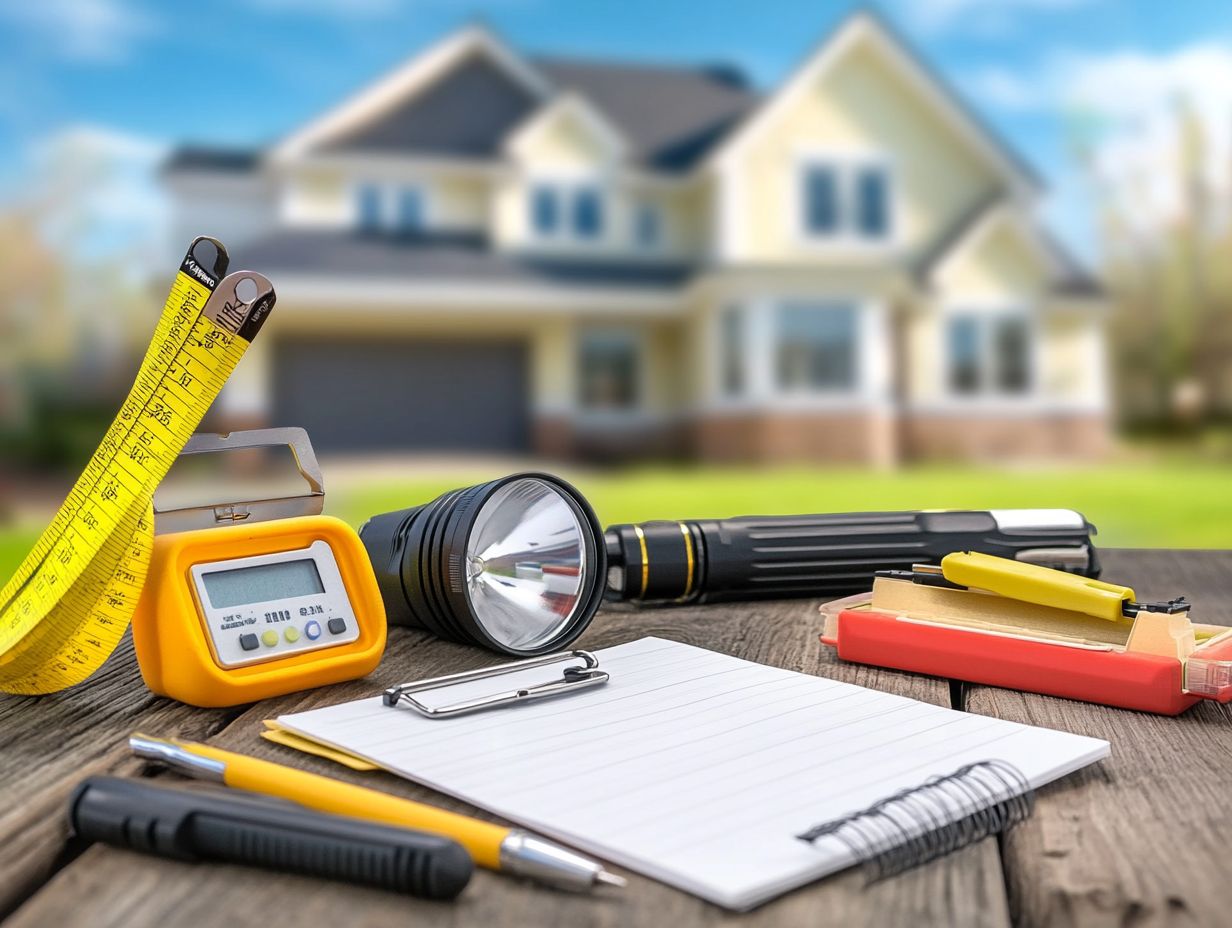
A comprehensive screwdriver set is essential for you as a home inspector. It empowers you to effectively tackle a range of tasks from securing loose fixtures to conducting thorough inspections of electrical panels and appliances.
Owning a versatile screwdriver set that includes various types and sizes brings significant advantages. It lets you handle more tasks easily, minimizing the time spent looking for the right tool. This ease of use ensures that your inspections flow seamlessly, allowing you to swiftly switch between Phillips, flathead, and specialty screwdrivers as needed.
The portability of a well-organized screwdriver set lets you easily carry your tools to different job sites. This convenience boosts productivity and improves assessment quality, ensuring that no crucial detail slips through the cracks during the inspection process.
9. Tape Measure
A tape measure is an essential tool for you as a home inspector. It enables precise measurements of spaces, structural elements, and clearances to ensure compliance with building codes and standards.
You ll encounter various types of tape measures, each suited for different applications in your inspections. Flexible tape measures are particularly handy for measuring curved surfaces or tricky, intricate spaces, while rigid ones excel in straight-line measurements, perfect for walls and foundations.
Accurate measurements not only help you spot potential structural issues but also play a vital role in drafting detailed reports. By avoiding costly errors like underestimating the size of a room or missing essential clearance requirements precise measuring significantly enhances the quality of your inspection process.
This means you can deliver more reliable evaluations, ultimately benefiting both buyers and sellers in real estate transactions.
10. GFCI Outlet Tester
A GFCI outlet tester is an essential tool for you as a home inspector. It allows you to thoroughly assess the functionality of GFCI outlets, which help prevent electrical shock hazards.
These testers not only confirm that outlets are operating correctly but also ensure that the circuits are properly grounded. When you’re inspecting homes, knowing how to use the tester can reveal whether an outlet trips under fault conditions, ultimately protecting residents from potential electrical accidents.
If an outlet shows signs of malfunction, it could lead to serious consequences, including an increased risk of shocks or even electrical fires. By utilizing this tool during your inspections, you significantly enhance overall electrical safety, creating a secure environment for occupants by identifying and addressing potential hazards before they escalate.
11. Inspection Mirror
An inspection mirror is an invaluable tool for you as a home inspector. It allows you to see those hard-to-reach spots, like behind fixtures or under sinks, ensuring that your property assessments are thorough and accurate.
These mirrors come in a variety of shapes and sizes, including adjustable and telescoping models that enhance your flexibility during the inspection process. Some even feature integrated LED lights, which illuminate those dimly lit spaces, while others boast wide-angle lenses to give you a broader view in a single glance.
Using these inspection mirrors is a game-changer! They provide a clear visual of hidden areas, empowering you to spot potential issues like mold, leaks, or structural damage that could easily slip under the radar.
The ability to visualize these concealed spaces greatly enhances the integrity of your inspections, ensuring that both prospective buyers and current homeowners are fully informed about the condition of the property.
12. Circuit Analyzer
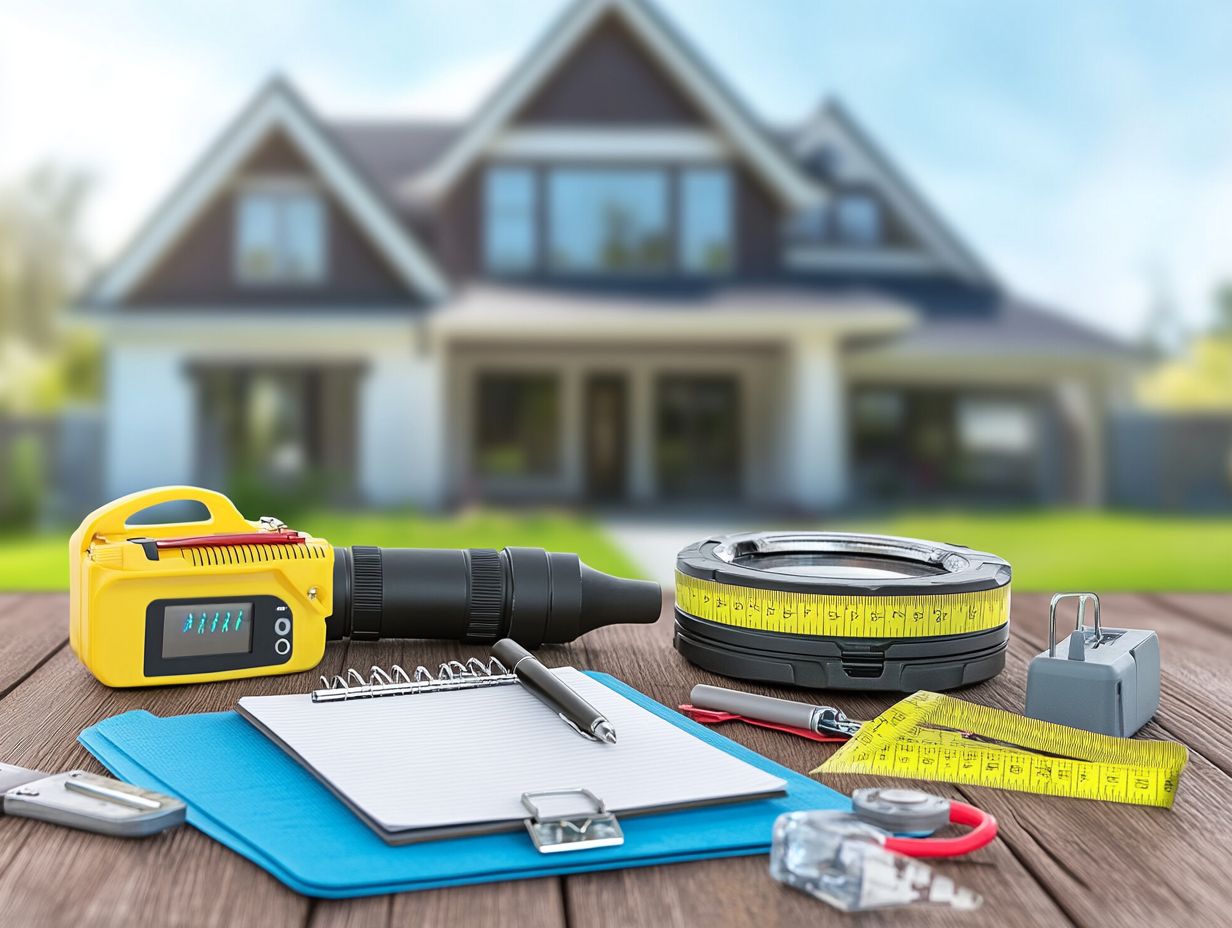
A circuit analyzer is a key tool for home inspectors. It helps evaluate the integrity and functionality of electrical circuits.
The circuit analyzer checks voltage, current, and resistance. This enables you to spot potential issues before they become serious hazards.
With options like analog, digital, and multifunction models, each type meets specific inspection needs.
These analyzers are crucial for uncovering wiring flaws, grounding problems, and load imbalances during inspections.
Using circuit analyzers ensures adherence to electrical codes. This enhances safety and provides peace of mind for homeowners.
13. Non-Contact Voltage Detector
A non-contact voltage detector is an essential safety tool. It allows home inspectors to identify live wires without direct contact.
This significantly reduces the risk of electrical shock. You can work with confidence while conducting inspections.
This device streamlines your workflow by providing quick readings. Unlike traditional methods, it allows for swift evaluations of electrical systems.
While these detectors minimize hazards, always wear protective gear. Insulated gloves and goggles are crucial for your safety.
14. Protective Gear
Protective gear is vital for home inspectors. It safeguards against hazards like chemicals, falling debris, and electrical risks.
This gear ensures your physical health and boosts the thoroughness of your inspections. Safety goggles protect your eyes from flying particles.
Gloves serve as a barrier against hazardous materials. Respirators protect you from inhaling dangerous dust in older buildings.
By following safety protocols and using the right gear, you empower yourself to conduct evaluations effectively and with confidence.
15. Home Inspection Software
Home inspection software is revolutionizing the industry by streamlining the reporting process. You can now craft professional reports using data and images collected during inspections.
This cutting-edge technology integrates seamlessly with digital cameras, allowing you to effortlessly upload high-quality images directly into your reports.
By enhancing your reporting efficiency, it slashes the time spent on paperwork. This enables quicker turnarounds without compromising quality.
The software improves communication with clients by providing real-time updates and access to detailed findings.
This builds trust and transparency! Your clients will feel informed and engaged throughout their home inspection journey.
Frequently Asked Questions
What are the essential tools for home inspectors?
The essential tools for home inspectors include a flashlight, ladder, moisture meter, electrical tester, thermal imaging camera, and a tape measure.
Why is a flashlight important for home inspections?
A flashlight is important for home inspections because it allows inspectors to see in dark or hard-to-reach areas, such as attics or crawl spaces.
What is the purpose of a ladder in home inspections?
A ladder is used to access areas that are elevated, such as roofs or upper levels of a house. It is important to have a sturdy and reliable ladder for safety.
How does a moisture meter help home inspectors?
A moisture meter is crucial as it detects moisture in walls, floors, and other areas, indicating potential water damage and mold, which can be costly to repair.
Why is an electrical tester necessary for home inspections?
An electrical tester allows inspectors to safely check for electrical currents and determine if any outlets or wiring are faulty, helping prevent hazards.
What are the benefits of using a thermal imaging camera in home inspections?
A thermal imaging camera shows temperature differences in surfaces, indicating issues like heat loss, moisture, or electrical problems, helping inspectors identify hidden issues.
Why do home inspectors rely on technology?
Home inspectors rely on technology to enhance their efficiency and accuracy, ensuring thorough inspections and detailed reporting.

